Misha Baudisch-McCabe
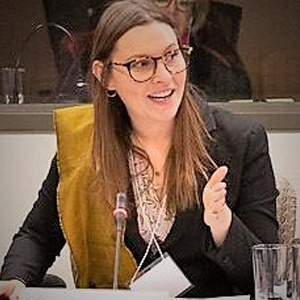
Promotion of gender equality, diversity and inclusion in the Canadian financial sector
Misha Baudisch-McCabe is a gender equality, diversity and inclusion professional with experience in North America, Africa, and the Middle East. Her work has included providing strategic and technical guidance on tackling gender and equity challenges, especially with relation to Science, Technology, Engineering and Mathematics (STEM). She has dedicated herself to evidence-based programming, with a specialization in the need for gender-based data collection and a gender-sensitive approach to evaluation. Her diverse experience includes managing gender equality programs across Francophone and Anglophone Africa. She has supported the organization of the Gender Summit - Africa for three years, the development of youth training tools and gender-responsive secondary-school STEM curriculum, as well as created a pilot promoting girls’ education through a unique outreach initiative marrying climate science and mathematics. Her current work focuses on the promotion of gender equality, diversity and inclusion in the Canadian financial sector.
Elizabeth Pollitzer
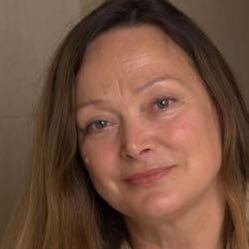 Director, Portia Ltd, UK; founder, Gender Summit
Director, Portia Ltd, UK; founder, Gender Summit
Elizabeth Pollitzer, (PhD (InfSc), BSc (Bio/Phys)) is the founder and director of Portia, which set up the Gender Summit in 2011 and has co-convened each summit since then. She is expert evaluator and adviser for the European Commission, and is involved in several EU projects. Elizabeth Pollitzer PhD is founder and Director of Portia, an organization devoted to improving gender equality in STEM and promoting the inclusion of the gender dimension in STEM. She has 20 years’ experience teaching and researching in the Departments of Computing and Management at Imperial College, University of London. Her original training was in Biophysics. She now applies this scientific background to her work as director of Portia. Portia was the coordinator of the genSET project, the Gender Summits were established as part of the genSET project.
Hale Ann Tufan
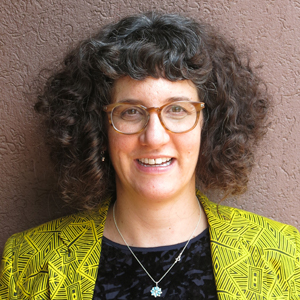
Co-Director of the Gender Responsive Researchers Equipped for Agricultural Transformation (GREAT) project, Associate Director for Gender for International Programs, and International Adjunct Professor of Plant Breeding and Genetics at Cornell University
Hale Ann Tufan is the co-Director of the Gender Responsive Researchers Equipped for Agricultural Transformation (GREAT) project, Associate Director for Gender for International Programs, and International Adjunct Professor of Plant Breeding and Genetics at Cornell University. She has a multidisciplinary background spanning Ph.D.-level research in molecular plant pathogen interactions, plant breeding with CIMMYT, international agricultural research for development program management, and gender capacity and strategy development across SSA. Her work focuses on building gender responsive agricultural research systems, through curriculum development and training delivery for GREAT, and leading research on priority setting, market research, gender research and on-farm testing for the Nextgen Cassava project and gender, quality trait preference profiling, and participatory processing evaluation for the RTBfoods project. She completed her PhD in molecular biology from the John Innes Centre, UK.
Sonia Laszlo
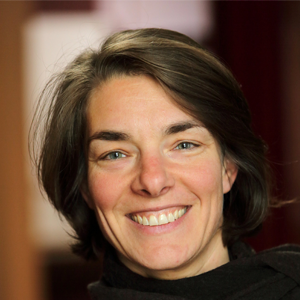
Associate Professor of Economics at McGill University
Prof. Sonia Laszlo is Associate Professor of Economics at McGill University. Her research expertise covers many aspects of applied microeconomic analysis in economic development. Specifically, she is currently working in two broad research areas: decision-making under uncertainty (namely concerning technology adoption among subsistence farmers) and the micro-economic effects of social policies and conditions (in the area of education, health and labour markets), with a focus on women. Prof. Laszlo has conducted her research in Peru, Kenya and in the Caribbean, using laboratory experiments, surveys or randomized controlled trials. Between 2016 and 2019, she was the Director of McGill’s Institute for the Study of International Development. She is also a member of the Centre Interuniversitaire de Recherche en Organizations (CIRANO) and the Grupo de Analysis para el Desarrollo (GRADE). In 2005 she co‐founded and has since been an executive member of the Canadian Development Economics Study Group (CDESG), which groups both academic and policy development economists in Canada.
Joanne Hughes
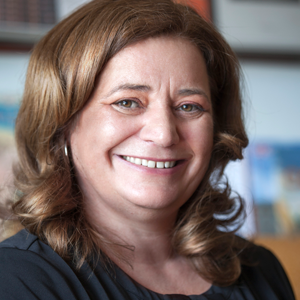
Executive Director for Emerging Leaders' Dialogues Canada
Joanne Hughes is the Executive Director for Emerging Leaders' Dialogues Canada and develops world class experiential leadership programs that focus on sustainable development and dialogue between industry, labour, civil society and government sectors. This includes programs to specifically address reconciliation and to forge trusting relationships among Indigenous and non-Indigenous leaders.She has managed an international secretariat, The Commonwealth Association of Public Administration and Management, liaising between foreign national ministries, the private sector, civil service organizations and donor agencies at senior levels in the planning and implementation of conferences and projects on public administration across the Commonwealth.Joanne has been active in community development through arts, culture and heritage, where her passion was ensuring those in the creative sector had access to funding, and that communities had access to cultural opportunities. Hughes was the Festival Producer for Ottawa Capital Pride, where she repositioned the festival to gain access to new funding to provide programming for marginalized communities, and is the founder of two festivals; Fernfest in Victoria, B.C., and the Ottawa Lumière Festival, which was voted one of the summers best festivals by the National Post.
Eliane Ubalijoro
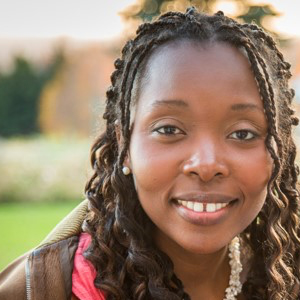
Deputy Executive Director (Programmes) at Global Open Data for Agriculture and Nutrition (GODAN) Secretariat
Dr. Eliane Ubalijoro is the Deputy Executive Director (Programmes) at Global Open Data for Agriculture and Nutrition (GODAN) Secretariat. She is a Professor of Practice at McGill University’s Institute for the Study of International Development. She is a member of Rwanda’s National Science and Technology Council, Presidential Advisory Council, a board member of the International Leadership Association and member of the board of trustees of WWF International. She is a member of the International Digital Monetary Council. A former scientific director in a biotechnology company, she has co-lead Bill and Melinda Gates Grand Challenges Exploration grants. Eliane has facilitated leadership modules in The Duke of Edinburgh’s Emerging Leaders’ Dialogues program. She has consulted in Haiti and Africa on economic green growth pathways. Eliane gave a TEDx talk on Reimaging the World from Scarcity to Prosperity. Eliane is the chair of the Scientific Program Committee for the Next Einstein Forum 2020.
Jemimah Njuki
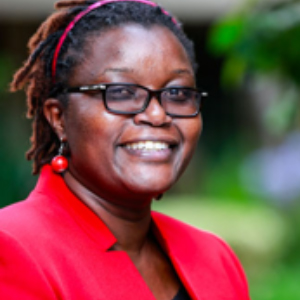
Director for Africa at the International Food Policy Research Institute (IFPRI)
Dr. Jemimah Njuki is Director for Africa at the International Food Policy Research Institute (IFPRI). She has more than 20 years of experience in the agriculture sector in Africa and Asia, working on gender equality and the empowerment of women. Her extensive resume includes positions with the International Development Research Centre (IDRC), CARE USA, and the International Livestock Research Institute (ILRI). She has served as Coordinator of the Growth and Economic Opportunities Program (2020) and Senior Program Specialist in the Agriculture and Food Security Program at IDRC (2013–2019); Program Leader for the Women in Agriculture Program at CARE USA (2012–2013); and Program Leader for the Poverty, Gender and Impact Program (2009-2012) and Senior Scientist at ILRI (2003–2009). She has worked widely in Africa, including in Malawi (2004–2007), Zimbabwe (2007–2009), and Tanzania (2012–2013), and has conducted field research in many other countries. Dr. Njuki has published extensively in gender and agriculture journals on topics such as gender and technology, impacts of women’s time in agriculture on caregiving practices and nutrition, indicators for women’s empowerment, trade-offs between market development and women’s income control, approaches for linking smallholder women farmers to markets, and gender transformative food systems. Her current research focuses on how to make food systems more equitable and gender transformative.
Rita Bissoonauth
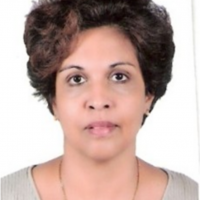
Head of the African Union International Centre for Girls and Women’s Education in Africa (AU/CIEFFA)
Dr Rita Bissoonauth holds a Masters degree in Biochemistry from the University of Lyon, France and a Ph.D. Education from the University of Quebec in Montreal, Canada. She presently heads the African Union International Centre for Girls and Women’s Education in Africa (AU/CIEFFA) based in Ouagadougou, Burkina Faso. Before moving to Ouagadougou, she was a Senior Policy Officer in Education for five years at African Union Commission in Addis Ababa. She also worked as a Senior Lecturer at the Mauritius Institute of Education, Mauritius and the University of Quebec in Montreal, Canada teaching Biochemistry, Molecular Biology and Science Education.
Jean Lebel
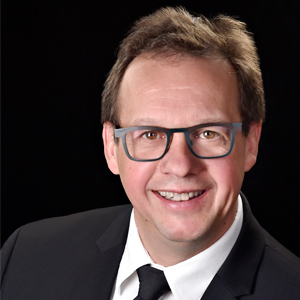
President, International Development Research Centre (IDRC)
Jean Lebel was appointed president of the International Development Research Centre (IDRC) on May 1, 2013. As part of Canada’s foreign affairs and development efforts, IDRC invests in knowledge, innovation, and solutions to improve lives and livelihoods in the developing world. Dr Lebel leads IDRC’s contributions to Canada’s international priorities. He is responsible for significant funding partnerships with foreign governments, philanthropic organizations, and the private sector. Dr Lebel previously served as vice-president of the Program and Partnership Branch, overseeing all IDRC programming. Before joining IDRC, he worked in both the academic and private sectors. He holds a PhD in environmental sciences from l’Université du Québec à Montréal and an MScA in occupational health sciences from McGill University. Dr Lebel has served on boards of the International Institute for Sustainable Development, the Consultative Group on International Agriculture Research, the Centre for Global Pluralism, the International Economic Forum of the Americas, and the World Economic Forum’s Stewardship Board on Economic Progress. Dr Lebel was also a mentor with the Pierre Elliott Trudeau Foundation (2016-2017).
Wanjiru Kamau-Rutenberg
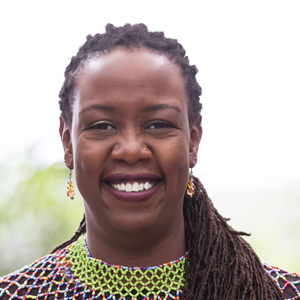
Director of African Women in Agricultural Research and Development (AWARD)
Dr. Wanjiru Kamau-Rutenberg is the Director of African Women in Agricultural Research and Development (AWARD). She is a 2018 Tutu Fellow, has been honored as a Champion of Change by the Obama White House, named one of the 100 Most Influential Africans by New African magazine, recognised as a Ford Foundation Champion of Democracy, awarded a United Nations Intercultural Innovation Award, & named one of Kenya’s Top 40 Women Under Age 40. Dr. Kamau-Rutenberg holds a PhD & Masters degree in Political Science from the University of Minnesota, a Bachelors in Politics and a Doctorate of Humane Letters (Honoris Causa) from Whitman College. She serves on the Selection Committee of the Africa Food Prize & is a member of the Malabo-Montpellier Panel, a high-level panel of independent experts supporting African governments & civil society identify & implement policies that enhance agriculture & food security. She also sits on the Board of Twaweza, East Africa’s largest public and policy engagement platform. Prior to AWARD, Dr. Kamau-Rutenberg founded and was Executive Director of Akili Dada, an award-winning leadership incubator that invests in high-achieving young women from under-resourced families, who are passionate about driving change in their communities. Dr. Kamau-Rutenberg was also an assistant professor of Politics at the University of San Francisco & a lecturer in International Relations at the Jesuit Hekima College, a constituent college of the Catholic University of Eastern Africa. Her academic research and teaching interests centered on African politics, gender, international relations, ethnicity, and democratisation, and the role of technology in social activism.
Audrey Namdiero-Walsh
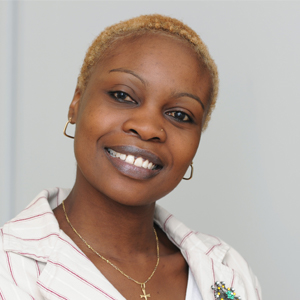
European Operations Director for AIMS NEI
Audrey Namdiero-Walsh is the European Operations Director for AIMS NEI where she oversees the day-to-day operations of the AIMS NEI Germany and AIMS NEI UK offices (two of the Advancement Chapters in the AIMS global network). She is also the Acting Director for Gender and Inclusion at AIMS NEI where she engages the AIMS network in a transformational process to effectively mainstream gender equality throughout the organization and its programs. With over 10 years of project management experience in the international development sector, Audrey contributes significantly to AIMS NEI’s grants management, stakeholder relationship management, donor engagement, and gender equality efforts. She holds a Bachelor’s degree in Psychology and a Master’s degree in Public Policy.
Dorothy Nyambi
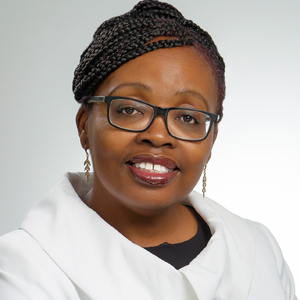
President and CEO of Mennonite Economic Development Associates (MEDA)
Dr. Dorothy Nyambi is the President and CEO of Mennonite Economic Development Associates (MEDA), a non-profit organization with a mission to create business solutions to poverty around the world. Dr. Nyambi holds a Doctor of Medicine Degree from the University of Yaoundé, Cameroon and has done extensive research on capacity building, advancing gender equality in developing countries, and innovation economies around the world. She is a current member of The Association of Women’s Rights in Development and the American Evaluation Association, among others. Beginning her career as a medical doctor, Dr. Nyambi later moved into the field of international development. Prior to joining MEDA, she was Executive Vice President of the African Institute for Mathematical Sciences (AIMS) and worked for organizations like the U.S. Peace Corps, World Health Organization and USAID. Dr. Nyambi is an advocate for blended finance initiatives in the international development sector and a champion of women’s rights around the world. Her experiences in the field have confirmed that entrepreneurship is a powerful way to alleviate poverty and empower sustainable communities.

 Director, Portia Ltd, UK; founder, Gender Summit
Director, Portia Ltd, UK; founder, Gender Summit








